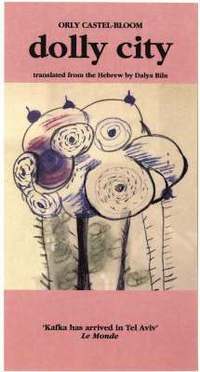Dolly City

Författare: Orly Castel Bloom
Genre: Roman
Ämnesord: hälsa, mord, psykologi, kultur
ISBN: 9780952942603
Genre: Roman
Ämnesord: hälsa, mord, psykologi, kultur
ISBN: 9780952942603


Köp boken på amazon.se (betald länk)
* Som Amazon-associates tjänar vi pengar på kvalificerade köp.
Begagnade:

Dolly, the novel's heroine, is afflicted with a disease that does not appear in the medical textbooks: she is a chronic sufferer from attacks of infinite possibilities. The novel is propelled by the author's wild imagination let loose, but what seems at first to be breathtaking madness turns out to contain pure logic. On one level, it is the story of the young physician, Dolly, whose home houses a laboratory for operating on animals. She adopts a hungry, blue baby boy whom she found in a bag by the side of the road. Worry and revulsion, rage and boundless love are all part of Dolly's complex attitude toward the boy, a kind of postmodern variation on the Jewish mother. Afraid that the child will contract diseases, she transplants various organs into his body and gives him every possible inoculation. To make sure that she does not lose him she grafts him onto her back, but when she gets tired of this subjugation she tries to drown him.
Mother-son relations are intriguingly illuminated in the second level of the text, also implying the complex bonds with the Land of Israel. Using a scalpel, Dolly, the physician, carves a map of biblical Israel on her son's back, just one of a series of images through which the author probes Israeli reality. As in her earlier fiction, Castel-Bloom writes about Tel Aviv, its squalor, its vitality, its ecological anarchy, and about the violence of modern urban life. Through her pungent style, her scenes of extraordinary plasticity, with hard, sharp wording and plenty of black humor, Castel-Bloom evokes the anxiety of a self-destructive world.
Bok recensioner av Dolly City :
2004-11-16 13:42
Jag har länge letat efter den här boken på Internet men den är oerhört svår att få tag i. Jag antar att jag bara hade tur då jag hittade den på mitt lokala bibliotek för några år sedan.
Det här är nog den galnaste och mest skruvade bok jag någonsin har läst och jag förstår långt ifrån allt. Men så kommer ju jag och författaren från vitt skilda kulturer och miljöer.
Även om jag inte förstår så gav den här boken en mycket angenäm läsupplevelse som jag inte skulle vilja vara utan. Den är så ny - för mig - i sin stil och uppbyggnad att jag efteråt inte kunde låta bli att tänka på den och minnas den med ett slags hatkärlek.
Jag tycker att om man någon gång får tillgång till den här boken så borde man läsa den.
Det här är nog den galnaste och mest skruvade bok jag någonsin har läst och jag förstår långt ifrån allt. Men så kommer ju jag och författaren från vitt skilda kulturer och miljöer.
Även om jag inte förstår så gav den här boken en mycket angenäm läsupplevelse som jag inte skulle vilja vara utan. Den är så ny - för mig - i sin stil och uppbyggnad att jag efteråt inte kunde låta bli att tänka på den och minnas den med ett slags hatkärlek.
Jag tycker att om man någon gång får tillgång till den här boken så borde man läsa den.
Betyg 3


"
Köp boken på amazon.se (betald länk) * Som Amazon-associates tjänar vi pengar på kvalificerade köp.
Skriv egen bokrecension till Dolly City
Liknande böcker:
Jag måste sluta tänka..
J. Sonck
J. Sonck
The queen's gambit
W. Tevis
W. Tevis
Det är vi som var Mulv..
J. Oates
J. Oates
Ristmärken
J. Theorin
J. Theorin
Årsboken
S. Karlsson
S. Karlsson
Eldsjäl
A. Åhman
A. Åhman
Stormberget
L. Marklund
L. Marklund
Innan Bron en Malmöber..
B. Lundberg
B. Lundberg
Mousa varats mysterium
B. Lundberg
B. Lundberg
Huset Versace
D. Ball
D. Ball
